EduChance
News
Workshops & Other Activities


Prof. Dr. Petia Genkova visited the Hellenic Mediterranean University in Crete and met with the representative of the Faculty of Management, Dr. Maria Markaki, in Agios Nikolaos, a branch of the university. There, together with Dr. Markaki's colleagues, they discussed several common points for future cooperation. It was decided that Dr. Markaki, Dr. Kleio Koutra and Dr. Eleni Koutsouraki will actively participate in the Horizon EU application. Dr. Markaki, Dr. Stelios Papadakis, Dr. Gareth Owens and Dr. Konstantinos Petridis expressed willingness to generally cooperate in the future. In addition, Dr. Markaki’s team will participate in the Cult_Open study and provide a translation of the scales so that a sample of Greek students will be obtained for the upcoming winter semester. Though Greece and Crete do not have a diversity structure, they have been greatly affected by the various refugee movements. Hence, attitudes towards diversity and refugees are of high importance. Furthermore, possibilities for joint teaching and Erasmus exchanges were discussed. It turned out that the profiles of Osnabrück University of Applied Sciences and the University of Crete have strong similarities – with similar faculties for music, engineering, agricultural sciences, and economic and social sciences. Study programs such as Business Psychology, Business Administration and Management, Economics, Nursing Sciences and Social Work, and other programs in this spectrum would also have strong interest in the cooperation.
We are looking forward to the new partnership, which will enrich our network, and to a joint cooperation in teaching and research.
New Research Partnership with Prof. Carla Cerqueira of the Universidad Lusófona de Porto in Portugal

Prof. Dr. Petia Genkova discussed and exchanged ideas with Prof. Carla Cerqueira of the Universidad Lusófona de Porto in Portugal with regard to the participation in the Horizon project and the Cult_Open study. This cooperation promises various interesting aspects, as Portugal is a classic colonial country and therefore holds plenty of migration experience.
The Universidad Lusófona de Porto is a private university resulting from the merger of two Portuguese universities, the Universidade Lusófona de Humanidades e Tecnologias and the Universidade Lusófona – Porto. The main objectives of the university are education, interdisciplinary research and the development of Portuguese-speaking countries and peoples. The University was founded in 1998 by the same institution that created the ISMAG and ISHT Institutes. It is currently managed by COFAC, a non-profit educational organization in Lisbon. The name “Lusófona” refers to the Portuguese-speaking countries and their common language and culture.
The Universidad Lusófona de Porto has campuses in Lisbon and Porto. It promotes equal opportunities and has over 16,900 students and 1,671 faculty members. It includes 15 faculties, schools and institutes. It offers a wide range of degree programs, including bachelor's, master's and doctoral degrees, as well as professional and technical courses. The Universidad Lusófona de Porto is internationally oriented and actively participates in research projects, including those funded by European programs. The University welcomes over 1,700 international students from 84 different countries. It has gained recognition and prominence, as demonstrated by its placement in various rankings.
We are delighted to have a new collaboration partner and look forward to future joint work.
Prof. Dr. Petia Genkova visited the Vrije Universiteit Brussel and met with Prof. Dr. Free De Backer and Ms. Margaux Pyls from the Innovation in Learning and Diversity research group. The research group is coordinated by Prof. Koen Lombaerts and comprises currently 20 active members. As a highly skilled research group, they analyze approaches for change in education and educational institutions, since there is a need to adapt to the changing learning needs of young people and adults. During the visit, possible collaborations regarding a joint Horizon Europe proposal on innovation regarding identities were discussed.
The Vrije Universiteit Brussel is considered to be one of the most renowned universities in Belgium and is therefore a very suitable cooperation partner. Moreover, Belgium is one of the countries in Europe where diversity is strongly promoted. Many companies show a high commitment to equal pay and fair working conditions, regardless of gender, age or religious affiliation.
During the visit, it was further discussed and decided that the research group will actively participate in the Cult Open project. The research group has already translated various psychological measurement instruments for this project.
We look forward to further future cooperation.



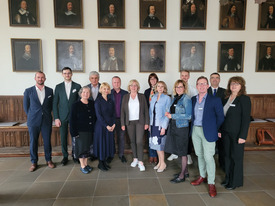
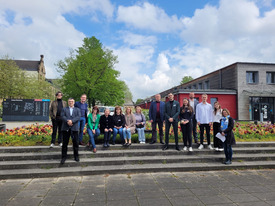
In the course of the EduChance project, a workshop with the theme “Differences unite” took place from May 8 to 11, 2023 at the Osnabrück University of Applied Sciences . The following representatives of universities from different European countries participated in the workshop.
Prof. Dr. Merita Xhumari, University of Tirana, Professor for Political Sciences
Prof. Dr. Michael Morley, University of Limerick, Professor of Management
Dr. Natasa Simic, University of Belgrade, Senior Research Associate
Prof. Dr. Matt Flynn, University of Leicester, Head of Department of Work, Employment, Management and Organisations
Prof. Dr. Yevhen Plotnikov, Nizhyn Mykola Gogol State University, Associate Professor
Dr. Oksana Shchotka, Nizhyn Mykola Gogol State University, Docent
Prof. Dr. József Poór, Szent István University, Professor for Management
Dr. Klara Veresné Valentinyi, Szent István University, Head of Department of Communication and Media Studies
Dr. Andrea Visztenvelt, Szent István University, Lecturer Assistant
Prof. Mehmed Gani?, University of Sarajevo, Professor for Economics
Within this interdisciplinary panel, scientific discussions were held as well as ways and solutions for integration problems were explored jointly. Therefore, during the workshop, presentations were made by the representatives of all participating universities.
As a group, Prof. Dr. József Poór, Dr. Klara Veresné Valentinyi and Dr. Andrea Visztenvelt presented recent findings from the organizational context regarding the Corona crisis and the Russo-Ukrainian war. In their presentation, they illustrated the impact of uncertain economic situations on management and HR in the context of the Corona pandemic and the war in Ukraine. Prof. Mehmed Gani? addressed the investor-happiness index in finance. As part of his research, he developed a model with financial economic factors for Bosnia. Going on, Prof. Dr. Matt Flynn presented the project “Dragons Voice”. This project aimed to support older migrants in the United Kingdom, with a focus on Chinese migrants. Prof. Dr. Michael Morley presented research on the Corona pandemic and its effects. It included a bibliometric analysis of publications regarding the Corona pandemic and revealed various social developments during the pandemic, e.g., differences in the distribution of tasks between genders at home. Prof. Dr. Merita Xhumari presented her research fields regarding social inclusion and social cohesion and as well as her role as a national and local expert for Albania. She also highlighted current social issues in Albania. Dr. Natasa Simic presented her research and previous projects in the field of psychology, inclusion and intercultural education. In a current project she is working on the role of ethnic identities of adolescents in Serbia. Thematically consistent, Prof. Dr. Yevhen Plotnikov and Dr. Oksana Shchotka spoke, among other topics, about their research in the field of higher education and (social) inclusion. They also addressed the current circumstances and impact of the war in Ukraine. Finally, Henrik Schreiber from Osnabrück University of Applied Sciences presented previous and current projects of the Competence Center Global Competence led by Prof. Dr. Petia Genkova. Here, the focus was on the project Cult_Euro_1, which enabled the development and validation of a test to assess Intercultural Competence.
At the end of the workshop, using a project work with different groups, concrete plans and steps were worked out on how to submit a joint Horizon Europe application and how to increase the societal impact for a project. In this work, among other things, a continuum of migration experiences regarding received support was created. Furthermore, different knowledge areas serving an impact towards different groups of stakeholders were identified, e.g., knowledge about inclusive societies, dealing with cultural differences or civic participation. The use of different approaches, such as a SWOT analysis, complemented this project work.
This project work as well as each presentation generated lively exchanges, questions and new ideas, so that the workshop served as an incubator for innovation. Both diverse and interdisciplinary ideas were exchanged as well as plenty of laughter was shared together. The workshop showed that science and research connect and provide for an increase in social cohesion as well as an international exchange towards a stronger European cooperation.
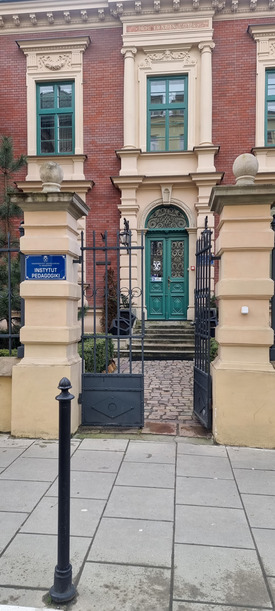

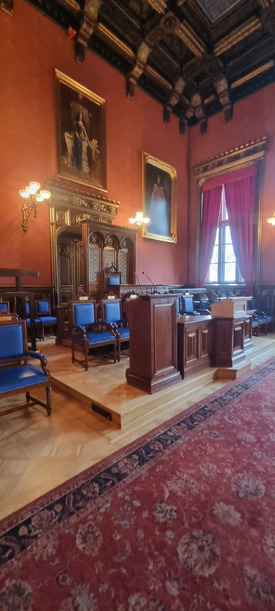
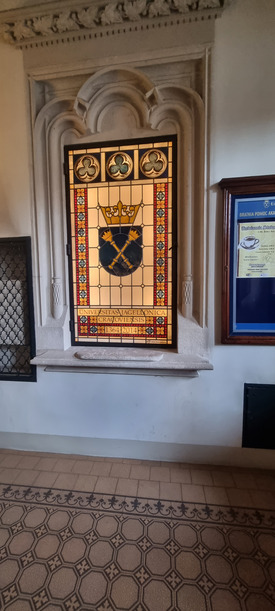


In the course of the third-party-project Edu Chance, funded by the federal ministry of education and research, Prof. Dr. Petia Genkova visited the Jagiellonian University in Kraków in April 2023. The visit establishing and strengthening cooperation between Prof. Genkova and Prof. Dorota Gierszewski, who holds the Chair of Pedagogy at the Jagiellonian University.
The Jagiellonian University, founded in 1364 under the Polish King Casimir the Great, is known as the oldest institution of higher education in Poland and is one of the oldest in Europe. From its very beginning and in later centuries, it attracted well-known personalities, such as Nicolaus Copernicus or Karol Olszewski, as well as Karol Wojty?a, later Pope John Paul II. The university originally comprised only three faculties: the Faculties of Liberal Arts, Medicine and Law. After the death of Casimir the Great, the university no longer existed, but flourished again in the 15th century, drawing students from all over Europe. Due to the Reformation and religious divisions in Europe, as well as the establishment of new universities in the 16th century, the Jagiellonian University entered a crisis. Entry to key offices in Poland was reserved for nobles, which led the university to form a bourgeois character. At the same time, the university competed with other new universities, but later hosted important Polish statesmen, writers and bishops. By the end of the 16th century, the university was known as the Krakow Academy. The 17th century was dominated by the struggle between the university and the Jesuits, who attempted to seize control of education in Kraków. Between 1777 and 1786 the Jagiellonian University was restored by Hugona Ko???taja, introducing, among other things, the development of natural and exact sciences and bringing in distinguished scientists. In 1805 the University merged with the Lviv University and was Germanized, however, in 1809 it was Polonized again. The university acquired its modern name, Jagiellonian University, in 1817. When Krakow was incorporated into Austria in 1846, the university was reorganized according to the Austrian model with German once again becoming the language of tuition. In the 19th century, as the Poles gained autonomy in Galicia, Polish again became the language of tuition. The university attracted students from various surrounding parts of Europe and there was a rapid development in different (human) sciences. During the Second World War, almost 180 scientists and staff members of the university were arrested by the Nazi Germans and deported to concentration camps. A group of scientists was executed by the Soviets in Katyn. The university was closed by the Nazi Germans and education began underground. When the war ended, the university became a refuge for scientists. During the communist era, the structure of the university was changed several times. In spite of political unrest, the university remained a place where excellent scientists worked in diverse academic fields.
At present, the Jagiellonian University teaches in 166 fields of study and consists of 16 faculties. In the academic year 2021/2022, over 37,000 students were enrolled at the university and almost 5,000 academic teachers were employed. The university plays an important role nationally as well as internationally. Over the course of the past centuries, the Jagiellonian University has had a significant impact on the development of Poland and Europe and is a symbol of Poland's educational and cultural tradition. Indeed, it has been considered an international institution since its foundation. In the past, Poles, Ruthenians, Lithuanians, Hungarians, Germans, Czechs, Swiss, English, Dutch, French, Spanish, Italians and Tatars already studied there. Still today it is an important place for cooperation between different cultures and countries and for cultural exchange.
During Prof. Genkova's visit, it was possible to plan and conclude an Erasmus contract between the Osnabrück University of Applied Sciences and the Faculty of Education at the Jagiellonian University. The cooperation of the universities enables students and researchers to complete study and research stays in the future. The stay also served to coordinate and plan joint research and transfer activities. Prof. Gierszewski will write one chapter each for the "Handbook for Global Competence" and for the "Handbook for Diversity Competence: a European Perspective" edited by Prof. Genkova. In addition, progress was made in planning a joint, bilateral research proposal on competence and intercultural competence, which will be submitted to the Polish Academy of Sciences and the German research community. Furthermore, Prof. Gierszewski will participate in Prof. Genkova's Cult Open Cross-Cultural Study and will survey students in Kraków on the highly topical issues of intercultural competence, integration and social identity. Furthermore, it was decided to further deepen the cooperation in the course of the Horizon Europe application "Reduction of discrimination and social conflicts and strengthening of social cohesion".
In the context of the EduChance project, Prof. Dr. Petia Genkova and Henrik Schreiber visited research partner Mihaela Vancea at the Universitat de Barcelona. During this visit various research ideas for future collaboration were exchanged. A workshop was held to introduce the entire TRALS (Transiciones Académicas y Laborales) research team and all national and international projects of the research group.
In the TRALS project academic transition processes are being analyzed and described and factors influencing them are being investigated in depth, with a focus on university transitions. It also aims at deepening the processes of transition to the labor market and the construction of models to explain them. Proposals for guidance and learning programs to improve transition processes will also be provided, and diagnostic tools for guidance at different levels in the educational system will be developed. Finally, the output of the project serves to analyze academic, professional and personal skills that contribute to personal and professional processes of development and transition, as well as to improve academic education in terms of quality, evaluation and innovation.
Furthermore, an exchange for collaboration between the two research groups (TRALS and Competence Center Global Competence) took place. Henrik Schreiber presented the current research projects of the Competence Center Global Competence and agreements for future data exchange as well as joint research and publications had been made and a joint Horizon EU application will be developed. The Spanish project partners will also have a special management function in the joint Horizon EU application. Further details will be discussed in online meetings in the near future. Furthermore, the visit included an exchange with the international office. Mutual presentations of the focus areas of the universities and the faculties were made, and possibilities for student exchanges and the conclusion of an Erasmus contract were discussed; the latter was very much welcomed by both sides. Further exchange as well as research discussions will be held digitally.
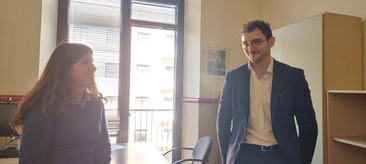
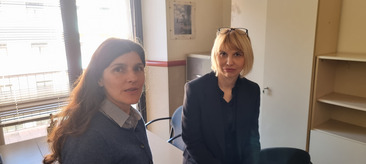

From 08.02.2022 to 11.02.2022, a hybrid workshop took place at the Osnabrück University of Applied Sciences as part of the DiversChance-East project. Representatives from Ukraine, Hungary, Lithuania, Spain and Germany came together to develop a new research project to explore the topic of diversity in an even more interdisciplinary way in the future.
During the four-day workshop, the representatives dealt intensively with the topics of diversity, inclusion and the reduction of discrimination in the workplace.
At the beginning of the workshop, the participants were first welcomed to the city of Osnabrück and given a tour of the city. After the welcome on the campus of the university by the vice president of the Osnabrück University of Applied Sciences, Prof. Dr. Lehmann, a campus tour followed.
Afterwards, each participant presented himself and his own research. This was followed by a professional discussion in the plenum. Here, the participants devoted themselves to the jointly planned research project and put together ideas for implementation in order to benefit from each other in the best possible way.
With the help of the workshop, a joint research outline was developed based on the different focuses of the contributors in the ongoing DiversChance-East project. The central idea is to reduce discrimination in the workplace based on certain characteristics such as age, gender or cultural background.
Over the next few months, the network will devote itself to actively exchanging research and ideas, with a view to then jointly submitting a European research proposal.
The aim of the project is to contribute to conflict-free intercultural communication and to ensure greater fairness and understanding.
